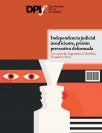04 Sep 2013
This is an executive summary of a 2013 report examining pretrial detention in Argentina, Colombia, Ecuador, and Peru.
The study examined factors both internal and external to the justice system that prevent judges and prosecutors from exercising independence in their decisions concerning the pre-trial detention of a defendant.
Tens of thousands of people in each of the four countries studied are currently in pretrial detention, awaiting a ruling on their guilt or innocence. Citizens in pre-trial detention are deprived of their liberty in advance of a sentence that has not yet been handed down and may or may not be the final outcome of the proceeding. Given the prison conditions in our countries, these prisoners find themselves in an especially harsh situation, since individuals in pre-trial detention are not housed separately from convicted offenders.
The main finding of the study is that in some cases pre-trial detention results from pressures brought to bear on prosecutors and judges that keep them from acting impartially and exercising the independence inherent to their positions. These pressures come into play at two levels. The first is a climate–internal and external to the justice system–that favors the broad application of pre-trial detention and resists using it only as an exceptional measure.
Second, that the justice system habitually discriminates against the most vulnerable while benefiting those with more means has a powerful influence on decision-making about pre-trial detention. As far as the latter, as noted in the Colombia report, the qualitative data gathered reveals “an unreasonable use of pre-trial detention, at least in specific cases where judicial officials find themselves under pressure.”
The discussion that follows aims to 1) explore this finding in light of the information gleaned from the national case studies; 2) examine the institutional weaknesses that hamper efforts to effectively counteract this climate and aberrant practices; and 3) explore areas where work needs to be done to surmount this problem.
Read the full report here.






